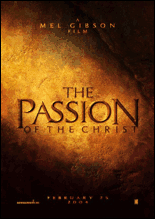The Passion of the Christ
(2004)
 |
Starring: James Caviezel, Monica Bellucci, Claudia Gerini, Maia Morgenstern, Sergio Rubini
Script:
Benedict Fitzgerald, Mel Gibson
Cinematographers:
Caleb Deschanel
Director: Mel Gibson
Plot: Following the last twelve hours of Christ, from his betrayal by Judas and his judgment before Pilate, to his torture at the hands of the Romans and his long walk to his final crucifixion atop Golgotha.
|
Review:
The hardest thing to do when talking about the harrowing
The Passion of the Christ, the latest adaptation of the stories of the Christian Gospels, is to separate the obvious statement of faith with the movie itself.
Donít expect any subtlety here: the film follows the best aspects of an exploitation film, with enough blood to make horror fans squeamish.
Though it provides most of the film's story, the beginning is somewhat awkward and a little too theatrical, especially when the forest scene is so obviously done on an indoor stage. However once the set-up is done and his trial begins, the narrative moves along in quite an engaging manner. Which leads to the end of the first half-hour, and the start of the filmís focus, Christís suffering.
An interesting detail is the depiction of Evil's presence as an androgynous woman flowing through the crowds giving the film it's only real "supernatural" essence.
The excruciating nine minute flagellation scene - involving barbed whips ripping flesh in vivid detail - is pretty gruesome and vicious and accounts for a large part of the filmís controversy.
Despite this bloodletting and lots of outward viciousness from all Jesusí tormentors, the second half gets a little repetitive, what with the trail of the Cross and the extended Crucifixion scene; they feel so long, one feels as if it's played out in real time.
The movieís climactic ďupliftingĒ moment comes with a too brief shot of the resurrected Christ.
Itís clear that this is foremost an interpretation of passages written much later in the 17th Century, and not of the New Testament.
Apart from the occasional flashback, there's little on the precepts of Christianity and only inklings of the rich Biblical story or its teachings come across. As such, it never allows the audience to appreciate why Jesus went though this ordeal (that is, to make up for the sins of Man). True, the story might be universally known and a certain background expected from audiences, but there's little indication here to make it part of the overall story.
With so much focus on the torture imparted on screen, the film leaves little room to explore Christ's teachings, resulting in the Christian message of love and forgiveness being lost.
To be fair, the film is meant to operate on a visceral level and in that it succeeds brilliantly. In fact, the film was originally meant to be a purely visual, cinematic event with the dialogue unfathomable to most viewers (for some added bit of realism, there was a risky decision to make the film in Aramaic and Latin). Through pressures, the film was sub-titled taking away, perhaps, some of that purely emotional rendering the experience required.
Itís obvious that viewers will either hate the film or love it, and that distinction might well be a question of Faith.
Yet looking beyond the substance, the production is appropriately grand and the cinematography is impeccable - nuanced, richly textured, and beautifully shot, it brings every bloody moment to vivid life. And the use of Madera and its distinctive architecture makes for a prime location to help us go back in time.
No matter opinions on Gibson's personal beliefs and despite his taste in manipulative melodrama or his over-use of cinematic tricks, he has proven here to be an accomplished director.
Covered in cuts and blood, Caviezel doesn't so much act as react to the continual punishment and one must appreciate the performance for making these physically difficult moments feel real.
One question that surrounded the release of the film was: Is the film anti-Semitic? As it stands, not really. It shows the Jewish religious elite scared of losing their power, and the crowds (unexplainably) crying for Christís blood. Those that get it far worse are the Romans, depicted as broadly evil, despicable one-dimensional savages. The exception is Governor Pilate and his aide, portrayed as sensible men faced with a political dilemma.
The overriding theme is that of manís inhumanity to one another and itís frighteningly effective in showing that Christ suffered greatly Ė if only it was more concerned with why it all mattered.
The Passion of the Christ is a gorgeous, gripping, powerful film, no doubt, but it's also a furiously shallow and manipulative one that drowns the message of Tolerance in blood.
Drama : 6/10
Don't forget to check out the Video
Review Library page for older reviews!
Home
/ Latest
Reviews / Review
Library / Now
Playing / Coming
Soon
Hong Kong Cinema! / Top
10 Box-Office / Top
20 Lists / Film
Fests / FAQ
/ Favorite
Links
